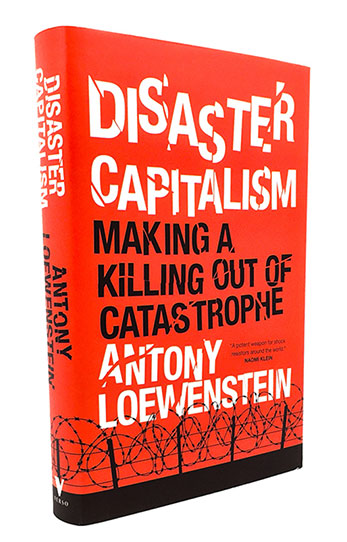Understanding Ethical Catastrophe on a Global Scale


Antony Loewenstein, author of Disaster Capitalism: Making A Killing Out Of Catastrophe, rounds-up a series of op-eds in response to the ever-worsening global emergency of crisis-profiteering. Loewenstein's analysis of contemporary news items offers a coherent frame for understanding the source and scope of this ethical catastrophe on a global scale.
Disaster capitalism surrounds us every day, from European firms aiming to make money from the refugee crisis to corporations turning a profit from the man-made crisis rescue business. It’s become so ubiquitous, people turning a profit from misery, that many simply ignore its presence or feel powerless to stop it.
I’ve recently been on a book tour in the US and UK for my new title, Disaster Capitalism: Making A Killing Out Of Catastrophe and speaking about the countries that feature in it: Afghanistan, Pakistan, Haiti, Papua New Guinea, Greece, Britain, America and Australia. These are all nations that either export exploitative policies globally – think of British firm Serco operating detention centres in Australia and unaccountable American contractors in Afghanistan – or abuse the most vulnerable closer to home.
During the recent 10-year anniversary of Hurricane Katrina, I told Al Jazeera English’s The Stream that opportunists saw a unique opportunity after the disaster to impose unequal education, healthcare and housing options. One decade later, the evidence remains strong that privatizing public services has left African-Americans disadvantaged. And yet there are still defenders, as I explained in Al Jazeera America:
"Envy isn’t a rational response to the upcoming 10-year anniversary of Hurricane Katrina,” Chicago Tribune editorial board member Kristen McQueary wrote in a recent column, referring to the monster storm that nearly wiped out the city of New Orleans in 2005. “Hurricane Katrina gave a great American city a rebirth.”
McQueary wished for a storm to wipe away Chicago’s corruption, slash the city’s budget and introduce private education. However, she did not mention how African-Americans in New Orleans were disproportionately affected by the disaster or how race became a determining factor in what was rebuilt, how and where.
The economic system is rigged. In my book I follow the money and explain how companies are able to continually score contracts in the West and the rest even though they consistently fail to deliver (the Special Inspector General for Afghanistan Reconstruction issues regular reports on wasted and lost US money in the war-torn state). I wrote in Al Jazeera America:
Since the global economic meltdown in 2008, financial firms such as Bank of America received tens of billions of dollars of government money to save them from collapse while committing vast fraud in the process. Virtually nobody was punished. Former U.S. Attorney General Eric Holder, legally obligated to hold these companies to account, didn’t just squib his responsibility, he even returned to corporate law firm Covington & Burling after leaving office earlier this year to work again with corporations on its client list that he failed to prosecute when in office.
While the financial elite plays with each other’s toys, the American population has rarely been so reliant on state handouts. More than 1 in 5 children need food stamps. The middle class often struggles to pay rent, students are burdened with debt, and Americans, according to studies, have little hope for the future.
During my various public events in the US and UK I was often asked how to stop this trend of unaccountable corporate and government power. There’s no simple answer though bringing the voices of those assaulted by outsourced power is an important start. I like the recent call by US Presidential candidate Bernie Sanders to end privatized prisons and detention centers. Such initiatives deserve large public support.
During interviews on Democracy Now! and Rolling Stone I stressed that refugees, the under-privileged and the interned are often voiceless and don’t deserve to be made little more than numbers to be processed for profit. A healthy society is defined by how it treats its most vulnerable. Greece is one of the worst examples of an undemocratic European Union imposing extreme austerity on a society that is already suffering (Salon published an extract of my chapter here).
A key aim of writing Disaster Capitalism (along with the film in progress of the same name) is to highlight how our modern, globalized world often benefits the corporate elites in the West at the expense of those we have occupied militarily or economically by featuring local individuals who are fighting back.